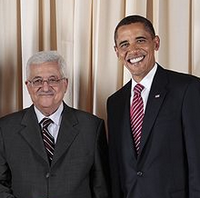The long war between Israel and the Palestinians is not the root cause of all conflicts between Islam and the West, but it exacerbates every such conflict. From Northern Europe through North Africa, the Middle East, Pakistan, Malaysia, Thailand, the Philippines, Indonesia, and down to Australia, there are violent opponents of "the West" motivated, in part, by indignation at the sufferings of the Palestinians. Various solutions to the Israeli-Palestinian conflict have been proposed -- the "Jordanian option" (or "no state" solution), the "one state" solution (i.e., a single multicultural state), and so on. But for the present, at least, the "two state solution" still seems to most observers to be the best prospect (see here, here, and here).
Immediately upon taking office, U.S. President Barack Obama and members of his administration made it clear that they were committed to a two-state solution and were willing to quarrel with Israeli Prime Minister Benjamin Netanyahu to achieve one. As an opening move, the administration demanded that Israel accept an absolute settlement freeze. According to Secretary of State Hillary Clinton, "We want to see a stop to settlement construction, additions, natural growth -- any kind of settlement activity." Vice President Joseph Biden, addressing AIPAC, said the Israelis would have to "not build more settlements, dismantle existing outposts, and allow the Palestinians freedom of movement." Sen. John Kerry told AIPAC that the settlements "strengthen Hamas by convincing everyday Palestinians that there is no reward for moderation."
It now seems clear that the Obama administration's opening move has failed. True, Netanyahu has uttered the words "Palestinian state," but he has laid down conditions he knows the Palestinians will never accept, and has clearly rejected the Obama administration's demand for a settlement freeze. The U.S. response has been mixed, or at least in need of clarification, with some reports saying it has compromised on its apparently absolute demand, and others saying it hasn't. In either case, moderate Palestinian leaders have been damaged, exactly as Elliott Abrams predicted when the demand was first made: "Either he [Abbas], too, will have to call any partial moratorium a real freeze, returning to the table while Hamas happily explains that he has once again given away Palestinian rights -- or he'll have to refuse to negotiate, which would anger Obama. Lose-lose." Frustrated, Abbas has announced his retirement.
According to Frida Ghitis, "The administration is learning from its mistakes and better understanding the nuances of this complicated conflict." The demand for a settlement freeze now looks like one of its mistakes. The U.S. now seems to want bilateral negotiations between Israel and the Palestinians to begin again without a total freeze. Netanyahu also wants negotiations, but many suspect his purpose is only to keep the Palestinians talking while Israelis settle more and more of the West Bank. "For 16 years," wrote Akivar Eldar, "the soft murmur of the 'peace process' that has been leading nowhere has drowned out the roar of the bulldozers that are deepening the occupation."

